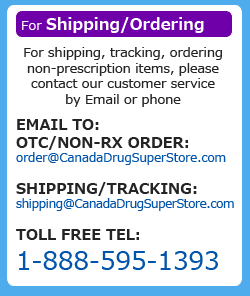 |
 |
|
||||
|
*Please note images shown may differ from actual product.
|
|||||
| U.S. law change (Aug 29, 2025): Packages may face customs fees, duties, or tariffs on some items (customer's responsibility). No refunds or replacements for abandoned, confiscated, or delayed packages. Check your country's import rules before ordering, we are not responsible if your package is refused. We're a small family run Canadian company and will ship with care, but customs and couriers are beyond our control. |
|
|||||||||
We Accept |
Canada Drug Superstore *PLEASE NOTE* We do NOT accept personal checks/cheques, or money orders. Please make sure you order with a credit card that we accept. |
||||||||
| JNC Technology Inc. |
|||||||||
© 2026 Canada Drug Superstore: www.CanadaDrugSuperstore.com All Rights Reserved. Privacy Policy |
|||||||||
